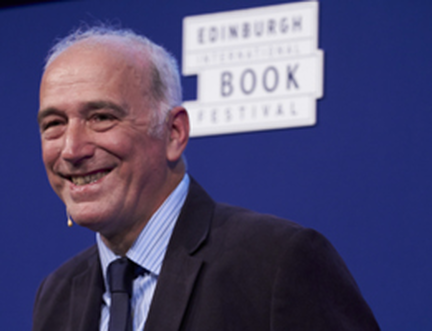More articles Tuesday 16 August 2016 8:00pm
Aberdeen Has Suffered a Calamity says Mike Shepherd at the Book Festival

One might think that discovering an oil field would be a fairly dramatic business, but geologist Mike Shepherd insists it wasn’t that big a deal. “You don’t get the oil rushing up out of derricks like you did in Texas,” he told the Book Festival last night at a launch event for his book Oil Strike North Sea. “You look at rock samples under UV light and if there’s oil present you get this brilliant fluorescent yellow…” Two and a half million barrels’ worth of yellow showed up in the field that Shepherd and his colleague had accidentally hit on - “tiny by North Sea standards,” he modestly insisted, but still worth a cool £38 million to his then-employer, BP. Worth a Christmas bonus, surely? “No. I was just doing my job.”
That this particular discovery happened purely by accident is fitting, Shepherd explained, in the context of an industry that was itself kicked off by serendipity. His book relates the Ealing Comedy-esque scenario whereby a rig set up for demonstration purposes at a trade fair near The Hague accidentally struck real oil. Ownership of the commodity has since been subject to similarly haphazard processes and decisions. The UK, Shepherd noted, gave up its chance to control the bulk of the oil in the North Sea when it signed a trade agreement favourable to Norway. “The Americans wouldn’t have done it,” Shepherd dryly observed.
Since then the supply, retrieval and sale of oil has remained at the forefront of world events and political discourse. Shepherd is under no illusions that the current crash in the oil price has had catastrophic consequences for his home town of Aberdeen. By the end of this year, he said, some 120,000 people are liable to have lost their jobs. “And that’s in an industry that’s still one of the biggest in the country. That’s a calamity.” And a personal one, too: “I haven’t been able to work in the industry for the past two years.” With the caveat that “if you could predict he oil price, you’d be a billionaire,” his own cautious position is that the price is likely to recover once the current glut is used up – a period of about two years. But that recovery won’t solve the general problem of sustaining energy supply in Britain. “A big debate needs to happen: what is our energy policy? What is the plan?”
The controversial process of fracking, could, he says, provide Scotland’s second oil and gas boom – but only if you dismiss the political sensitivities around it, people’s very real concerns regarding global warming, and the commitment the UK made to reducing fossil fuel consumption as part of the Paris agreement. His own suggestion, with all those issues taken into account? “I’d like to keep the lights on. My opinion is: they should do everything. Get the Chinese to build nuclear power stations. Go bigtime on offshore wind. Even try fracking. We need to do everything possible – and even a bad plan is better than no plan.”
In the meantime, he advocates a lot of waiting and seeing, and more investment in research and development. There’s still the promise of an end to the current downturn – and of more fluorescent yellow turning up. “That’s when the oil price will really go through the roof. l I might even get a job.”

 Major new partnership with Celtic Connections
Major new partnership with Celtic Connections 

